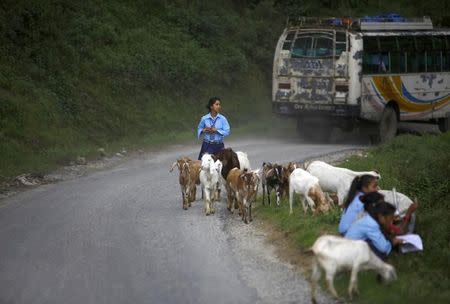UK must cut aid for Nepal if 'endemic' corruption persists - report

By Kieran Guilbert LONDON (Thomson Reuters Foundation) - The British government should make cuts to its 86 million pound aid budget for Nepal unless the country takes action to combat poor governance and "endemic" corruption, a parliamentary committee said on Friday. The Department for International Development (DFID)'s funding has seen Nepal make huge progress in health, water and sanitation, but this spending will only be justified if governance improves, the International Development Committee (IDC) said. DFID should also address the needs of women and girls in Nepal, who are at risk of trafficking, early marriage, domestic abuse and murder, by working to change social norms and ensure justice for victims, the IDC said in a report. The IDC is a parliamentary committee which monitors the performance of DFID, Britain's development aid ministry. Britain passed a bill earlier this month that enshrines in law its commitment to spend 0.7 percent of its gross national income on aid every year. It met the target for the first time last year - spending 11.4 billion pounds ($17 billion) on overseas aid - making it the first G7 country to meet the U.N. target. "Nepal suffers from poor governance, and corruption is endemic," committee chairman Malcolm Bruce said in a statement. "If Nepal is to become less corrupt, improvements in governance and a change of culture have to be made to state institutions." Wedged between China and India, Nepal was ranked 126th out of 175 countries in watchdog Transparency International's global corruption perception index last year, down from 116 in 2013. The committee said working with local non-governmental organisations instead of the state was not a solution, as both are "prone to corruption in a corrupt society". DFID's aid budget for Nepal increased to 86 million pounds in 2014/15 from 55.9 million in 2012/13 for building roads, reforestation and disaster risk reduction, the report said. Given that Nepal is ranked one of the most disaster-prone countries in the world, Britain should carry out disaster reduction work on a larger scale, the IDC said. The committee called upon DFID to provide support for female members of parliament and parliamentary committees, and to back local elections through existing government programmes to avoid further corruption. It also praised the aid ministry for providing technical support to the Investment Board of Nepal with plans to build two major hydro-electric schemes that aim to address the country's chronic power shortages. "If traditional political problems are overcome and these schemes are successful, the Nepalese economy could be transformed and DFID could begin to develop an exit strategy," Bruce said. (Reporting By Kieran Guilbert, Editing by Alex Whiting)

